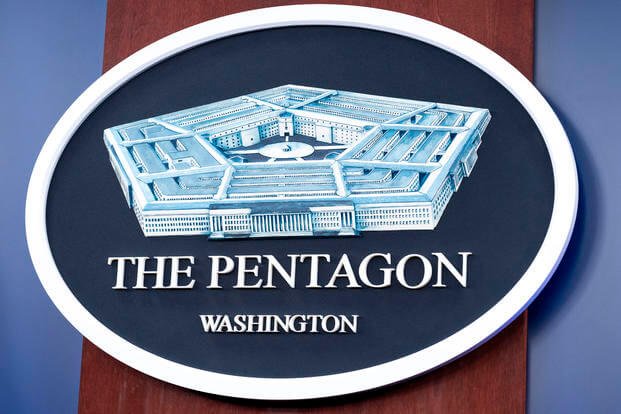Senators Voice 'Deep Concerns' About Trump's Pick for Air Force Under Secretary

Democratic senators voiced serious concerns Thursday about a former Space Force[1] officer's political social media posts, as well as being fired from command in 2021, at a hearing weighing his nomination to serve as the Air Force[2]'s second-highest civilian leader.
Former Lt. Col. Matthew Lohmeier, who was nominated by President Donald Trump earlier this year to serve as the under secretary of the Air Force, previously served as commander of the 11th Space Warning Squadron at Buckley Space Force Base[3] in Colorado. But he was fired from his position in 2021 after an appearance on a podcast where he promoted his self-published book, "Irresistible Revolution: Marxism's Goal of Conquest and the Unmaking of the American Military."
Sen. Jack Reed, D-R.I., the ranking member on the Senate Armed Services Committee, told Lohmeier he was concerned about comments the former Guardian made once leaving the military and also expressed concerns that he'd seek retribution for those who sought his removal from command.
Read Next: 'This Is Going to Be a Challenge': Service Officials Detail Fallout from Civilian Resignations Pushed by Trump[4]
"I must confess, I have deep concerns about your ability to represent these men and women," Reed said. "While I appreciate your past military service, your record of troubling conduct in uniform, extreme partisanship and animosity towards military members with whom you disagree politically, is, in my view, disqualifying to be the under secretary."
Reed bought up a post that Lohmeier made on X on Oct. 19, 2024,[5] where he wrote: "If we are fortunate enough to see a Trump presidency once again, then there will be serious consequences for those senior leaders who have broken their oath, betrayed the trust of the American people, and participated in the hyper-politicization of the uniformed services."
The former Space Force officer declined to provide follow-up comments to Military.com on Thursday.
Lohmeier said during the hearing that the "post was put on X in my private capacity as a private citizen in 2024," adding that he "enjoyed my ability to speak freely and express a full range of the expression of my ideas" since leaving the military.
He said during the hearing that he would seek accountability from service members and leaders, but the post "was not intended to be retroactive or retributional in nature."
Several other Democratic leaders joined Reed in criticizing Lohmeier's views and opinions shared on social media.
Sen. Mazie Hirono, D-Hawaii, took aim at his views on the Jan. 6, 2021, insurrection at the Capitol, when hundreds of Trump supporters broke into the building and assaulted police officers in an effort to overturn former President Joe Biden's election win.
In an Aug. 9, 2024, post on X[6], Lohmeier described the riot as "a gov't-led false flag and hoax at the Capitol."
Sen. Mark Kelly, D-Ariz., questioned his stance on Russia's invasion of Ukraine after the former officer shared in a Feb. 9, 2024, post on X[7] a 2014 paper titled: "Why the Ukraine Crisis is the West's Fault."
Lohmeier claimed the posts were mischaracterized, saying of Jan. 6 that there is "so much uncertainty about what was really going on" during the day of violent protests and adding "all heads of state have to make determinations for their own security" when asked about Russia's invasion of Ukraine.
He joined the service in 2006 after graduating from the Air Force Academy[8] in Colorado Springs, Military.com previously reported[9]. Lohmeier flew the T-38 Talon[10] as an instructor pilot and later the F-15[11]C Eagle. He transferred into the Space Force in October 2020.
Lohmeier told lawmakers last year that he submitted an inspector general complaint, alleging that the garrison commander of Buckley Space Force Base had "unethically used his position to promote anti-American propaganda." He said his complaint "was never investigated and was later dismissed" by then-Lt. Gen. Stephen Whiting.
After writing and promoting his book, Lohmeier was fired from his command of the 11th Space Warning Squadron at Buckley Space Force Base by Whiting.
Notably, Whiting was later promoted to four-star general and now currently leads U.S. Space Command.
On his firing, Sen. Tammy Duckworth, D-Ill., questioned why Lohmeier did not file an Article 138 complaint, a formal process where a service member can express wrongdoing by a commander, after his inspector general complaint into the Buckley commander was dismissed.
Lohmeier said he did not file an Article 138 complaint but claimed he had "exhausted all of the means that I understood available to me" prior to publishing his book.
Duckworth said she was concerned.
"How can we expect you to lead airmen and Guardians?" Duckworth said. "You were relieved of command not for your beliefs, but for how you chose to express them on active duty while holding a position of authority over others."
In October, during a town hall in North Carolina where Trump was campaigning for his second term, Lohmeier took the stage and told Trump he should establish a "special task force, office or position" to remove diversity, equity and inclusion efforts throughout the military.
"I'm going to put you on that task force," Trump told him and later nominated him to serve as the under secretary of the Air Force.
When questioned by senators on Thursday whether he'd seek retribution for those who have differing political ideologies, Lohmeier claimed he would not and that airmen and Guardians would welcome him to the position.
"I think that we have many great men and women in uniform, high and low, who all have the right to try their best to serve this country faithfully and I don't necessarily agree with all the decisions they make, but I'm not a vindictive person," Lohmeier said. "I love all people, and I think that men and women in uniform will be very grateful to see me come back into service if confirmed."
Related: He Met Trump After Being Booted from the Space Force. Then, He Was Tapped to Help Lead the Air Force.[12]
© Copyright 2025 Military.com. All rights reserved. This article may not be republished, rebroadcast, rewritten or otherwise distributed without written permission. To reprint or license this article or any content from Military.com, please submit your request here[13].
